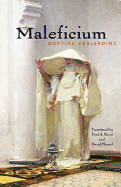
In Latin, maleficium refers to "an evil deed, injury, sorcery," and Martine Desjardins acknowledges that her novel's title was inspired by the Malleus Maleficarum, the infamous 15th-century treatise on witches. Constructed like a Chinese box puzzle, Desjardins's Maleficium contains confessions from seven men stricken by repulsive ailments--and one "demonic, harelipped" woman responsible for bringing these ailments upon the men.
Set in the heyday of empires, the novel's central theme--the ruthless exploitation of cultures and natural resources for commercial and scientific purposes--still resonates with 21st-century readers. The "evil deed" in Maleficium is civilization itself. Civilization is "evil" because it often gravitates toward plunder and rape. Fueled by perpetual desire, the male confessors--collectors of rare insects; traders of spices, tortoise shells, fragrant soaps, Persian carpets--only want to violate or accumulate, not to connect on a human level. On the other hand, civilization means retributive justice for the disenfranchised, even if this notion of justice--from the oppressor's view--resembles sorcery or usurpation.
Mannered and ornate, the novel's multi-framed narrative yields facets of a deeply conflicted self. Maleficium's core mystery is Vicar Jerôme Savoie, a Montreal priest who transcribes the confessions, thus breaking the vow of secrecy that the sacrament of confession requires. Since there is no other proof regarding the existence of the priest, or even for the veracity of the recorded confessions, the novel becomes an intricate game involving the nature of truth and fiction. --Thuy Dinh, editor, Da Mau magazine

